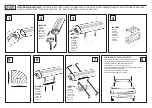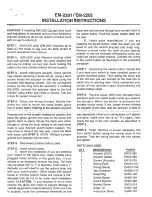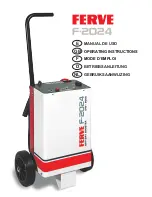
Air Ride Suspension
The air ride system is a compressed air devise that supports a portion of your vehicle loads.
Failure may occur as a result of punctures, impact damage, improper inflation or improper
usages. Proper use and proper maintenance will help you gain the maximum benefits.
Review the manufacturers operating instruction manual for complete information concerning
torque specifications, air pressures, operating instructions, troubleshooting and maintenance.
A Routine (daily) visual inspection front to back and side to side while the unit is on level
ground should be performed.
Wheels and Rims
Refer to the chassis owners’ manual for information on wheel replacement and torque
specifications and additional information on care and maintenance.
•
Daily inspect for damaged or loose, missing or stripped mounting bolts and/or lug nuts.
Repair or replace items as necessary and properly torque. A replacement wheel should have
the same load carrying capacity, diameter, width, offset and mount as the one replacing.
•
To clean wheels, use a wheel cleaner (diluting the products 50% before using), and rinse
completely to prevent discoloration or peeling of the wheel covers. To clean aluminum
wheel covers, use a mild detergent and warm water or an aluminum cleaner specifically
made for wheel covers. Do not use abrasive cleaners.
CAUTION
:
Using the wrong replacement wheels, bolts or nuts can affect the braking
and handling of your vehicle. Using wrong replacement wheels can also cause the tires to
lose air, possibly causing the loss of vehicle control resulting in a serious accident.
CAUTION
:
Check lug nuts for proper torque value after rotations as loose lug nuts
could cause the wheel to become loose and possibly fall off.
Tires
Refer to the manufacturers owners’ manual for more information on care, maintenance and other
tire specifications. Rotate as recommended by the tire and/or chassis manufacturer.
•
Daily inspect for the wear, cuts, punctures, bulges, damage or tread separation, damaged
valve stems and/or missing valve caps – replace as necessary.
•
Tire pressure should be checked at least once a month or especially before a long trip.
•
To clean tire, use a tire cleaner (diluting the products 50% before using) and be sure to rinse
completely to prevent discoloration or peeling of the wheel covers.
19
CAUTION
:
Under-inflated tires can cause the tire to overheat. This can result in the
tire losing air suddenly and/or catching on fire. Under inflated tires can result in poor
handling, which could result in a serious accident. Over-inflated tires are more likely to be
cut, punctured or broken by sudden impact (such as a pothole) and result in a serious
accident. Check all tires frequently to maintain the recommended air pressure.
Summary of Contents for Starcraft Bus
Page 30: ...29 NOTES ...











































